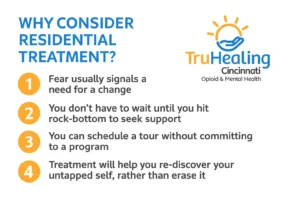You’ve been thinking about it.
Maybe not out loud, but late at night, in the quiet moments—you wonder. Would a residential treatment program actually help?
But then fear shows up. Loud and fast.
“What if it’s too intense?”
“What if I don’t belong there?”
“What if I go and come back worse?”
You’re not alone. Fear of the unknown keeps so many people stuck in the loop between curiosity and action. At TruHealing Cincinnati, we’ve walked with hundreds of clients who almost didn’t come—until they did.
Here’s how to move through the fear without letting it drive the decision.
Fear Is Normal—But It Doesn’t Have to Be the Final Word
Let’s get this straight: fear is not failure.
It’s your brain trying to protect you from something unfamiliar. But protection isn’t always precision. Sometimes fear screams, “Danger!” when all that’s really happening is change.
If the idea of a residential treatment program makes your stomach drop or your chest tighten, that doesn’t mean it’s wrong for you. It means it’s big. And sometimes, big is exactly what healing needs to be.
What matters isn’t eliminating fear—it’s moving with it.
You Don’t Have to Be “Worse” to Justify Going
This one’s huge.
So many people delay treatment because they tell themselves, “I’m not that bad.”
They compare themselves to rock-bottom stories or assume they need a full-blown crisis to qualify.
But truth?
You don’t have to be falling apart to ask for more.
Residential treatment isn’t just for people who’ve lost everything. It’s for anyone who’s tired of white-knuckling their way through life. Who wants to go deeper. Who wants to stop cycling through “almost okay” and start building something solid.
You Can Get Clarity Without Committing
The fear of “signing your life away” is real. But residential treatment isn’t a trap. It’s not a one-size-fits-all sentence. And you don’t have to say yes to everything just to explore your options.
You can:
- Talk to someone about what residential really looks like
- Ask about average length of stay, daily routines, and goals
- Request a tour or virtual walkthrough
- Explore how our residential treatment program in Cincinnati personalizes care
Learning doesn’t mean locking in. And often, just getting information can quiet the panic and give you power back.
Treatment Doesn’t Erase You—It Helps You Come Home to Yourself
One common fear? That treatment will change you in ways that feel fake.
You might wonder:
“What if I come back bland?”
“What if I lose the parts of me that are fun, social, interesting?”
Here’s the truth: the goal of treatment isn’t to scrub your personality. It’s to unbury it. Opioids, alcohol, anxiety, trauma—they cover things up. They flatten us. They pull joy through mud.
A good residential program doesn’t replace who you are. It helps you reconnect with the version of you that didn’t have to hustle for peace.
You’ll Be with People Who Get It
The idea of living with strangers can feel terrifying. But here’s the surprise: for many clients, the community becomes the most healing part.
You’ll meet people who:
- Get your humor
- Have made similar mistakes
- Aren’t shocked by your pain
- Want you to win—without competition
It’s not about forced friendships. It’s about shared humanity. And in a culture that often isolates people who are struggling, that kind of connection can be life-saving.
Whether you’re local or looking for a residential treatment program in Lexington, Kentucky or Louisville, Kentucky, we’ll help you find that sense of belonging.
You’re Allowed to Want More, Even If Life Is “Fine”
Maybe you’re functional. Holding a job. Keeping up appearances. Not using every day.
And yet, something feels off. You’re tired of pretending, tired of managing, tired of feeling like you’re almost okay but never really free.
Guess what? That’s reason enough.
You don’t need catastrophe to justify care. You’re allowed to want more. More clarity. More energy. More depth. More you.
At TruHealing Cincinnati, we believe the decision to enter residential care isn’t about proving how bad it’s gotten. It’s about how good you’re ready to feel.

Success Doesn’t Always Look Like a Movie Ending
Let’s be real: not everyone comes out of residential treatment with glowing skin and a 10-year plan.
Sometimes success looks like:
- Getting eight full hours of sleep for the first time in months
- Learning how to be bored without reaching for a substance
- Crying for the first time in years—and letting someone witness it
- Feeling safe in your own body, even for a moment
That’s transformation. And it adds up.
Every client story we’ve seen started with the same thing: doubt. But the ones who took a breath, asked the question, and walked through the fear? They’re the ones who found a life that felt like theirs again.
Ready Isn’t a Feeling. It’s a Choice.
If you’re waiting to feel “ready,” you might wait forever.
There’s no magic moment when the fear fully disappears. No sign from the universe that says, “Now you’re allowed.”
You get to choose. Scared. Unsure. Half-convinced. That’s still a choice. And it’s a powerful one.
You can take that step today. Or tomorrow. Or whenever it clicks. But when you do—when you finally push through the fog of uncertainty—you might just discover something you forgot was possible:
Peace.
Still unsure, but a little bit curious?
Call (888) 643-9118 or visit our Residential Treatment Program page to learn what it could look like—no pressure, no judgment, just a real conversation about what’s possible.


